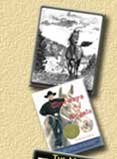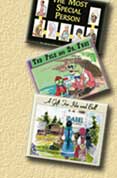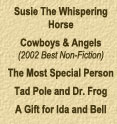
Michael's Monthly Column "Throwing My Loop"
Throwing My Loop…
By: Michael Johnson
IMPROVING PERFORMANCE…
I’m obsessed with it.
Improving performance, I mean. No matter what line of work
we are in, we could still do a bit better. In sales, in
parenting, in roping, and any other facet of life, we could
improve. And the proof that we can is right before our
eyes…
No matter what we would strive to do well, there is
someone right around the corner who can do that thing in a
higher fashion than we can. We can spot a more successful
salesman a mile away, our friend seems to parent his or her
child in a way that brings a rich relationship, and Lord
knows, we can certainly see a better horseman, and we wonder
how he or she can move the horse with no detectable physical
cues. Indeed, it seems they are moving the horse with their
mind. Why is that? Why are some people such high
performers, and how do they become that way?
Do those people who seem to do things well have some special gifts that we lack? Are they smarter, better looking, or just plain luckier? At one time, my thinking was if I could just find a good horse like that woman over there had, then I could look really professional on my horse too. She just got lucky; her horse was better than mine. While it’s true some may be more gifted, I don’t think that’s the real secret of high performers. After thirty years of watching them - and spending the last decade interviewing some very skilled and accomplished people - I’ve found some interesting differences between their behavior and mine…
No. 1 – High performers work on their game! For some reason in my former life, I thought when you became really skilled at something, you could kick back and relax. Just sit up there and laugh at all those below you, and make money, win money, sing or play the guitar, or write a book with ease. Okay, that’s wrong.
The best in the world work
harder than everybody else. I don’t like that rule, but
that’s the way it is. That’s the rule. Butch Harmon said
he thought Greg Norman was the hardest worker in the world
until he began coaching Tiger Woods. The greatest player in
the world worked harder than everybody else in the world.
When a musical group has a hit record, then that success
requires them to play a concert in a different city every
night for eleven months straight. I was in the audience one
night listening to the famous novelist, James Michener, and
someone asked him, “Where does your talent to write all
those thick books come from?” The question seemed to annoy
him. He said, “Madam, I’ve answered that question hundreds
of times. I don’t have any more talent than any of you in
this room. I wake up every morning, brush my teeth, shower
and dress. Then I stand in front of my typewriter for six
hours each day, 365 days a year. If you did that, you could
write big thick books too!”
When world champion roper, Speed Williams, won
his first roping crown in the late 90’s, he felt like he had
arrived, and by his own admission, thought perhaps he might
not have to work as hard. At his first rodeo in the new
year, he failed to even hit the steer with his loop, much
less catch the steer. “I knew I had to go back to work,” he
said.
So, that is one valuable lesson we can learn from high
performers. It may sound corny, but hard work is the key.
When I applied a strict practice regimen to my roping, and
maintained it for years, my skills far surpassed those I
possessed even when I was young. Close observation of high
performers has taught me they believe the work is never
done. What a good tip that really is, brothers and
sisters.
No. 2 – High performers think the
right way!
Have you ever tried ‘positive thinking’ and
failed? We all have. I had a student once who told me,
“That stuff you talk about doesn’t work!”
“Why do you say that?” I asked him.
“I sat in my room the other night, and over and over, I
said I would make a one hundred on your test, and after
repeating that positive affirmation one hundred times… I
made a 40!”
Simply repeating positive statements is just
wishing and wishing doesn’t work.
There is such a subtle difference between how high
performers think and how others think, but that difference
is so powerful…
Listen carefully to the high
performer’s words. “I stay within myself,” they will say.
“I don’t try to do anything I can’t do,” we hear them say,
meaning they rarely take a shot they know they can’t make.
Or sometimes we might hear, “I can’t control what other
people do.” Contrast those statements with those we hear
from low performers…
“My horse is acting up today; I know I’m going to have
problems with him.”
“I’ll have to have my best performance ever to do well
here.”
“That guy over there shouldn’t be in our group. He’s
better than everyone here.”
Those negative thoughts about performing at a level we
have never reached, or the fact that we are competing with
someone better than us build tension, drain positive energy,
and cause us to lose focus. Dean Oliver won eight world
championships in calf roping, and everyone knew if old Dean
had ever had a good horse, he would have won so many more.
But even he admitted, “I was never much of a trainer, and
never did have a really great horse.” He won anyway.
High performers tune out the competition, and we all
wish that we could. Here’s some news…we can. After roping
for years, and spending many of those early years worrying
about what someone else would do, I finally learned I cannot
control what they do. I can only focus on what I can do.
If I can learn to do that, you can.
No. 3 – High performers know how to handle failure! Perhaps the most valuable key I’ve learned from peak performers is failure is your best friend. After a really bad stage performance years ago, I knew that this business was not for me. I went to visit a master of the game, a man who had helped me greatly. Crying in my beer, I told him about my embarrassing and humiliating experience, and how I had no choice but to set my dreams aside, and quit. He listened patiently, and once I was done, he stood and thundered, “Who on earth are you to think you are exempt from mistakes?” I was stunned. I couldn’t believe this dear friend of mine didn’t feel sorry for me. “GET UP AND GET BACK OUT THERE!” he screamed at me. I did, and now I know that man knows more about helping people than I ever will. The most important difference between high performers and all the rest, is high performers can handle humiliation better. And instead of quitting when their soul is crushed…they learn from the experience, and continue on!
At a roping a few years ago, I had a chance to win $1000.00, and all I had to do was catch the last steer. I split the horns, meaning I caught the right one, but failed to catch the left one. In my former life, I would have been depressed, discouraged, and walked around berating myself for choking. But high performers had taught me something of great value. They forced me to ask myself the key question…“What do you do after you fail?” Man, that’s a good question. If you can answer that question the right way, your performance will begin to improve. It’s a dead lock cinch.
After that failure, instead of getting down on me, I went to my trailer. In the blistering heat of the day, I roped the dummy one hundred times, and on each and every swing, made a pronounced finishing motion with my arm to insure the loop cleared the left horn. I didn’t wish. I analyzed my mistake, then went to work on correcting it. For the rest of the roping, I really didn’t care if I caught steers or not, but I did care if my arm finished the swing. I didn’t split any more horns. As Rosie Austin says, “We all make mistakes, but we don’t have to keep making the same one twice.” That is how high performers think.
So the mystery has been cleared up just a bit – for me at least – how some people seem to do better. They work hard, they think the right way, and they use failure in a positive way to win. And I’m thankful to finally learn, that woman over there doesn’t really have a better horse than me after all. Mine can be just as good as hers…if I’m willing to do what’s required to help him. So it is with each of us.
Michael's latest release, Reflections Of A Cowboy, is currently available in audio book form. The two volume set consists of articles, essays and excerpts from radio performances about good people and good horses in the life of an Oklahoma cowboy. Approximately 8 hours in length. Reflections Of A Cowboy in printed form is scheduled for release in the summer of 2005. Order from Michael's website.
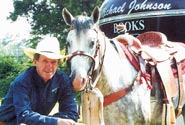 |
|||||
|
|
|||||
|
|||||
|
|
|||||
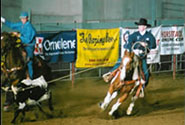 |
|||||
|
Michael heading for the great Sonny Gould |
|||||
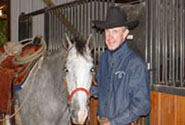 |
|||||
|
Michael & Blue |
 |
|
Please stop |
|
|
|
Send Michael |
Michael Johnson Books
michaelspeaks@msn.com
1172 CR 4122 Campbell, Texas 75422 (903) 862-2082

webmaster
pswope@candw-webmasters.com

